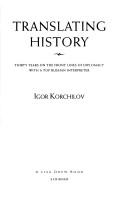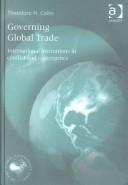
ISBN: 0684814188 Year: 1997 Publisher: New York (N.Y.): Scribner
Abstract | Keywords | Export | Availability | Bookmark
 Loading...
Loading...Choose an application
- Reference Manager
- EndNote
- RefWorks (Direct export to RefWorks)
Summit meetings --- Translating and interpreting --- History --- Gorbachev, Mikhail Sergeevich, --- Korchilov, Igor. --- Soviet Union --- Foreign relations
Book
ISBN: 1786433559 1786433540 Year: 2024 Publisher: Northampton : Edward Elgar Publishing,
Abstract | Keywords | Export | Availability | Bookmark
 Loading...
Loading...Choose an application
- Reference Manager
- EndNote
- RefWorks (Direct export to RefWorks)
"With a novel focus on the individual members of the G20, this innovative book explores the perspectives and behaviours of those within the global summit, unpacking what they are seeking to achieve, how they go about doing this, and the domestic impact of the G20. Providing insights from the summit, Hugo Dobson comprehensively analyses the G20's development and practices from the perspectives of the nineteen member states and one inter-governmental organisation that have shaped it. Chapters examine members' reactions to the upgrading of the G20 to a summit of leaders in 2008, its development thereafter into the premier forum for international economic cooperation, and the expansion of its agenda beyond macroeconomic issues to a range of global collective action problems. Looking at its future from a country-specific perspective, Dobson concludes that the G20 will continue to engage with stakeholders and evolve in terms of its membership, as seen in the decision at the 2023 Delhi summit to include the African Union, thereby providing a basis for future research on its members' perspectives, positions and behaviours. This multidisciplinary book will be an invigorating read for students of international relations and politics, global governance, sustainable development, climate change and energy transitions, and security and terrorism. Its exclusive insights will also be of use to policymakers and third sector organisations who are stakeholders in the G20 process"--
Book
ISBN: 1474219381 147252974X 9781474219389 9781472529749 9781472532275 9781472529589 9781472534255 1472532279 1472529588 1472534255 9781472534255 Year: 2015 Publisher: London [etc.] Bloomsbury Academic
Abstract | Keywords | Export | Availability | Bookmark
 Loading...
Loading...Choose an application
- Reference Manager
- EndNote
- RefWorks (Direct export to RefWorks)
"This book examines six summits spanning the beginning and the end of the Cold War. Using declassified documents from U.S., British, and other archives, Chris Tudda shows how the cold war developed from an ideological struggle between capitalism and communism into a truly global struggle. From Potsdam in 1945, to Malta in 1989, the nuclear superpowers met to determine how to end World War II, manage the arms race, and ultimately, end the Cold War. Meanwhile, the newly independent nations of the "Third World," including the People's Republic of China, became active and respected members of the international community determined to manage their own fates independent of the superpowers. The six summits - Potsdam (1945), Bandung (1955), Glassboro (1967), Beijing (1972), Vienna (1972), and Malta (1989) - are here examined together in a single volume for the first time. An introductory essay provides a historiographical analysis of Cold War summitry, while the conclusion ties the summits together and demonstrates how the history of the Cold War can be understood not only by examining the meetings between the superpowers, but also by analyzing how the developing nations became agents of change and thus affected international relations."--Bloomsbury Publishing.
World politics --- Cold War. --- Summit meetings --- International relations --- Diplomacy --- History --- Conferences, Summit --- Meetings, Summit --- Summit conferences --- Summit diplomacy --- Summits (Meetings) --- Visits of state --- Coexistence (World politics) --- Peaceful coexistence --- Summit meetings. --- 1945-1989 --- Cold War --- 20th century
Book
ISBN: 9782809820478 2809820473 Year: 2016 Publisher: Paris: L'archipel,
Abstract | Keywords | Export | Availability | Bookmark
 Loading...
Loading...Choose an application
- Reference Manager
- EndNote
- RefWorks (Direct export to RefWorks)
Summit meetings --- Reagan, Ronald. --- Gorbachev, Mikhail Sergeevich, --- United States --- Soviet Union --- Foreign relations --- Reagan, Ronald --- Summit meetings - Iceland - Reykjavík --- Gorbachev, Mikhail Sergeevich, - 1931 --- -United States - Foreign relations - Soviet Union --- Soviet Union - Foreign relations - United States --- -United States
Book
ISBN: 9780062310194 Year: 2014 Publisher: New York Broadside Books
Abstract | Keywords | Export | Availability | Bookmark
 Loading...
Loading...Choose an application
- Reference Manager
- EndNote
- RefWorks (Direct export to RefWorks)
Reagan, Ronald --- Gorbachev, Mikhail Sergeevitch --- Summit meetings --- Iceland --- Reykjavik --- United States --- Foreign relations --- Soviet Union --- 1981-1989
Book
ISBN: 0511995202 1108028861 Year: 2011 Publisher: Cambridge : Cambridge University Press,
Abstract | Keywords | Export | Availability | Bookmark
 Loading...
Loading...Choose an application
- Reference Manager
- EndNote
- RefWorks (Direct export to RefWorks)
Recruited straight from university, Ernest Satow (1843-1929) became one of the most respected British diplomats, particularly in Japan, where he is still remembered. After a career spent mostly in the rapidly developing Far East, he retired in 1906. Just before the outbreak of war, he was asked to compile a work on international diplomacy, and 'Satow', as it has become known, was first published in 1917, and in updated versions has not been out of print since. Satow's work was pioneering, there being at that time no comprehensive study in English of diplomacy. Volume 2 concentrates on international conferences and congresses from 1648. Lasting weeks, and sometimes months, such gatherings were often, until well into the twentieth century, the only occasion when heads of state or government met face to face. We still live today with the consequences of many of these meetings.
Diplomacy. --- Summit meetings. --- Conferences, Summit --- Meetings, Summit --- Summit conferences --- Summit diplomacy --- Summits (Meetings) --- Diplomacy --- Visits of state --- History --- International relations

ISBN: 9780754615934 Year: 2004 Publisher: Aldershot Ashgate
Abstract | Keywords | Export | Availability | Bookmark
 Loading...
Loading...Choose an application
- Reference Manager
- EndNote
- RefWorks (Direct export to RefWorks)
Book
ISBN: 0813154375 Year: 2021 Publisher: Lexington : University Press of Kentucky,
Abstract | Keywords | Export | Availability | Bookmark
 Loading...
Loading...Choose an application
- Reference Manager
- EndNote
- RefWorks (Direct export to RefWorks)
Drawing on a host of recently declassified documents from the Reagan-Thatcher years provides an innovative basis to understand the development and nature of the relationship between the two leaders.
Presidents --- Prime ministers --- Summit meetings --- Professional relationships. --- History --- Reagan, Ronald. --- Thatcher, Margaret. --- United States --- Great Britain --- Foreign relations
Book
Year: 2000
Abstract | Keywords | Export | Availability | Bookmark
 Loading...
Loading...Choose an application
- Reference Manager
- EndNote
- RefWorks (Direct export to RefWorks)
Summit meetings --- Korea (South) --- Korea (North) --- United States --- Relations --- Foreign relations administration. --- Korea --- Korea (north) --- Political science
Book
ISBN: 9789633861691 Year: 2016 Publisher: Budapest : Central European University Press,
Abstract | Keywords | Export | Availability | Bookmark
 Loading...
Loading...Choose an application
- Reference Manager
- EndNote
- RefWorks (Direct export to RefWorks)
This book presents and interprets the archival records pertaining to the last meetings between Reagan, Gorbachev and Bush between 1985 and 1990, and the transcripts which include direct quotes by top leaders, as far as the interpreters and the notetakers managed to capture them. Important sources are the excerpts from the transcripts of the foreign ministers - Eduard Shevardnadze, Alexander Bessmertnykh, George Shultz, and James Baker - especially when they go face to face with the president or the general secretary. The summit conversations fueled a process of learning on both sides. Geneva 1985 and Reykjavik 1986 reduced Moscow's sense of threat and unleashed Reagan's inner abolitionist. Malta 1989 and Washington 1990 helped dampen any superpower sparks that might have flown in a time of revolutionary change in Europe, set off by Gorbachev and by Eastern Europeans (Solidarity, dissidents, reform communists). The high level and scope of the dialogue between these world leaders was unprecedented and appears to be largely missing in today's world.

 Search
Search Feedback
Feedback About UniCat
About UniCat  Help
Help News
News